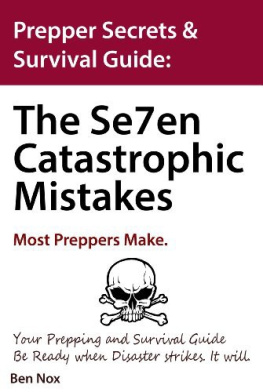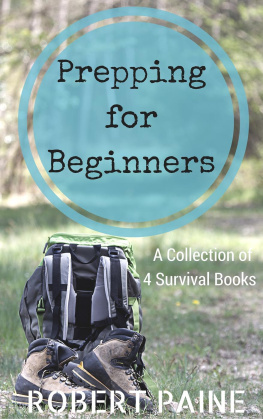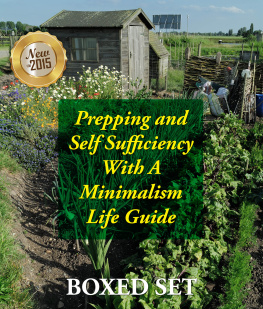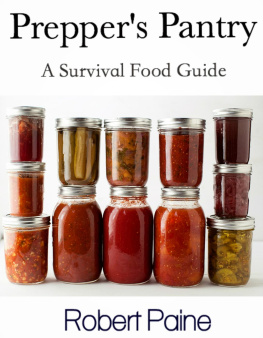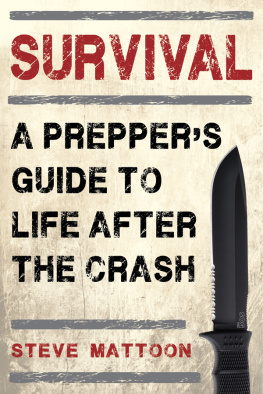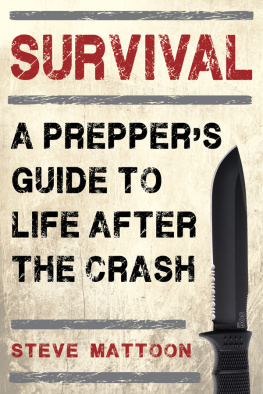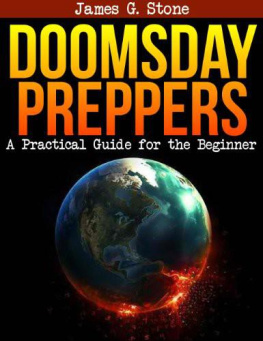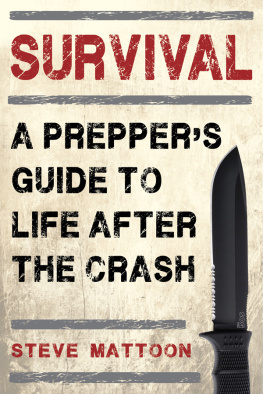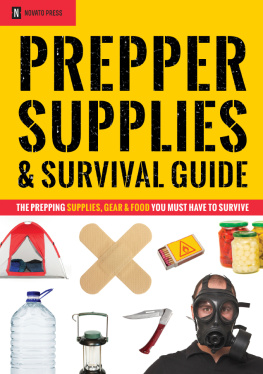Prepper Secrets and Survival Guide
The Seven Catastrophic Mistakes Most Preppers Make
Your Prepper and Survival Guide for 2014
Everything you find in this book is protected by copyright and should not be used without the written permission of the author
This book and the material covered is for informational purposes only. We take no responsibility for what you do with this knowledge. We cannot be held responsible for any property or medical damages caused by items you read about in this book. We would advise you to check your local laws. Some of the items we refer to are illegal in some areas, and we would highly advise you against building these in said areas. Any of the weapons we discuss should never be pointed at a person or animal.
The material taught throughout this book is for informational purposes only. By taking any information or education material from this book, you assume all risks for the material covered. You agree to indemnify, hold harmless, and defend Ben Nox and everyone involved from any and all claims and damages as a result of any and all of the information covered.
By taking and/or using any informational resources from this book, you agree that you will use this information in a safe and legal manner, consistent with all applicable laws, safety rules, and good common sense. You further agree that you will take such steps as may be reasonably necessary or required by applicable law to keep any information out of the hands of minors and untrained and/ or immature individuals.
Copyright 2014 Ben Nox
Introduction
Prepping and, by effect, preppers, have become a common topic in recent years. This is partially due to the influence of the media and the influence of television shows depicting survivalists or promoting survival tips. The general public has one of two possible images in mind when they think preppers. Either they think of people sitting in a basement huddling around a camping stove wearing a tin-foil hat or they think of scruffy mountain men outfitted with enough firepower to start World War III. Neither of these images depicts the real truth about preppers or their culture.
The primary concern with preppers is not to abandon society but, rather, to be as prepared as possible for scenarios that could result in the destruction of the current social structure. Prepping can be defined as simply being prepared for the future. The uncertainty about the future is generally what most preppers worry about when they make their preparations. What will there be to eat? Where will I stay? What will I do if the electricity is out? These types of questions are of the utmost importance to people who are concerned with prepping and survivalism.
There are, generally speaking, three major steps that are involved with prepping. The first step is to acquire supplies. The supplies, of course, all depend on the person doing the prepping but generally include food, tools, and weapons. The second step is to learn skills involved with surviving. These can be urban or outdoor survival skills and can range from fire starting to weapon maintenance. Finally there is a level of importance that is placed on the community aspect of survival. No man is an island and, thus, it only makes sense to include others in your plans. At the very least a person should include family and close friends in their plans. After a catastrophe there is really no telling who is worthy of trust and who isn't.
The Seven Catastrophic Mistakes
Through the process of prepping, there are always difficulti es to be encountered and dealt with. Most of the time these problems can be overcome fairly easily. There are, however, some problems that can be deceptively complicated and can snowball into catastrophic errors when faced with a real survival situation. These problems, of course, do not present themselves outright. They are only present when it is too late to actually do anything to resolve them and the issues that the present.
There are seven catastrophic mistakes that almost all preppers make at one point or another. These mistakes are not anyones fault and could, in truth, happen to anyone. Generally speaking, these problems can arise at any time during the process; especially when preppers lose a bit of the vigilance that they usually have toward their preparations.
Mistake 1 Mishandling of Food
The number one mistake that a prepper can make is to mishandle their food stores. The worst possible scenario for any prepper is for a disaster scenario to occur and for a prepper to find out that their food is rotten or otherwise inedible. This is not as crazy as it sounds and it is actually an extremely common occurrence in the prepping community.
The first issue that can come up with the mishandling food is simply not buying enough of it. A person should take stock of how much food intake they have on a given day (or how much their familys intake if others will be using the cache). Once the daily food intake is quantified, determine how much food will need to be purchased and stored by multiplying the daily food intake by the length of time a person wants to have food readily available without leaving the home.
The formula, then, is: (food storage) = (daily intake) * (length of comfortable survival time)
A second aspect of this mistake is prepping the wrong foo d. Food storage should primarily be dry goods and canned goods. Fresh vegetables, frozen foods, and foods that require refrigeration are not a good idea because they will rot almost immediately in the event of a power outage. Store things like rice, dry beans, water, canned meats, canned vegetables, and quick energy sources such as energy bars. Another good idea is to store a large container of sugar and powdered drink mixes.
The final aspect of food mishandling that preppers make is in the storage of food. Food storage principles are somewhat obvious (for the most part). Don't store food by chemicals. Don't store meat and vegetables together. Don't store things in areas of excess heat. Try not to store things directly on the ground (shelving is a better option in almost every case). Here is a list of guidelines that can be followed both in emergencies and prior to emergencies in order to store food safely and successfully.
Mistake 2: Lack of Long Term Plans
The second catastrophic mistake that most preppers make is having an utter lack of long term plans. Storing items is a wonderful thing to do. It will help you be prepared for any emergency. With that being said, it will only go so far in a long term emergency situation. Without a long term plan there is no telling what will happen when the food and the other supplies run out.
The first step to creating a good plan for a disaster situation is to have a good map and a route out of the area just in case it is needed. It is better to be prepared than to be caught unawares. Get a list of friends and family that you may wish to find in a survival situation and discuss your plans with them. Set rally points in order to have somewhere to meet. Have maps. Have a compass. Plan what to do in case your city is uninhabitable or if your home is breached. Is there a place to go outside of the city? Do you have the skills to find your own food and to survive outside of your current location if your storage is used up or lost somehow? All of these questions need to be answered. Long term plans are essential to any preppers planning phase.
A long term plan will, at the very least, include the following:
- What to do if food runs out

